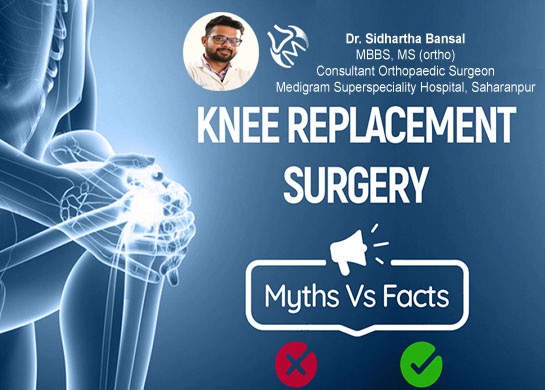
Myth 1: knee replacement is a surgery with very low success rate
Fact: total knee replacement surgeries have a success rate of 95% in most cases. It is the best and most commonly performed surgical treatment for those who cannot perform routine activities due to knee arthritis and other disorders. Knee replacement efficiently helps you perform pain-free activities of daily living.
Myth 2: knee replacement surgery must be delayed as much as possible
Fact: no, it is not required to wait for the surgery until the pain becomes intolerable. Osteoarthritis is a degenerative disease that continues to damage the joint and deform the shape of bones around the knees. Unnecessarily waiting for surgery and delaying it, is technically more challenging for the surgeon and it causes patients’ health to deteriorate overtime and increases the likelihood of surgery related complications. Also replacing a severely damaged knee may reduce the longevity of the replaced joint because of technical complications.
Myth 3: medications should be continued as long as possible to avoid knee replacement surgery
Fact: medicines including painkillers just give symptomatic relief for a temporary duration and prolonged usage is associated with serious side effects such as renal failure, peptic ulceration etc. People with advanced arthritis definitely require surgery and cannot be cured by medicines.
Myth 4: knee replacement is only for elderly people
Fact: knee replacement is not a procedure exclusive to older age group. People of all ages can get knee replacement surgery if the knee joint is damaged beyond repair. Several rheumatoid patients or the patients with traumatic knee injuries may require knee replacement at a relatively younger age.
Myth 5: no surgery as only few years of life are left
Fact: you never know how much life is left beyond this point. Also, following knee replacement, mobility and thereby general condition of patients is improved adding years to their life. Age is not a contradiction for surgery. If clinically fit, elderly patients regularly can also get knee replacement surgery done.
Myth 6: knee replacement will limit my activities
Fact: it’s actually quite the opposite. Knee pain restricts the normal activities. After a knee replacement, knee becomes painless and functions the way it is meant to and patients then able to do all the things they want that previously couldn’t be done because of a painful knee joint.
Myth 7: it takes months to recover after a knee replacement surgery
Fact: patients become independent for toilet activities within 24 hours after surgery. Weight bearing and knee bending is done by this time. Patient can use stairs within 24-48 hours following surgery. At around 2-3 weeks patients can participate in outdoor social activities. Majority of patients can resume their routine life within 6 weeks.
Myth 8: knee replacement is a very painful surgery
Fact: with modern day pain management techniques, the patient does not feel any pain during surgery or in post operative period and has a smooth recovery.
Myth 9: driving is impossible after knee replacement surgery
Fact: driving a car becomes a lot easier after knee replacement surgery and most of the patients can drive a car within 6-8 weeks of the surgery.
Myth 10: obese people cannot undergo total knee replacement surgery
Fact: weight doesn’t matter for knee replacement surgery. Studies have shown equivalent results of knee replacement in average and obese patients. Many patients wait for long duration in hope to lose weight and undergo surgery which becomes quite impossible in presence of painful arthritic knee joints which limits the exercises. And interestingly, many patients are able to lose good amount of weight following knee replacement surgery as activities improved.
Myth 11: knee replacement cannot be done in patients with diabetes, high blood pressure or heart diseases
Fact: diabetes, high blood pressure or heart disease is not a contraindication for knee replacement surgery. A thorough pre-anaesthetic check-up is always done before undergoing surgery and any issues are dealt with accordingly. Yes, its true that the blood sugar level and blood pressure should be in control before the procedure but it does not make anyone unsuitable for undergoing knee replacement surgery.
Myth 12: the replaced knee lasts only for 8-10 years
Fact: with modern day precision including good technique and newer and better quality of prosthesis the replaced knee last 20- 25 years or longer and, for many people, will last a lifetime.
Myth 12: both the knees cannot be operated on at the same time
Fact: it is better to undergo the total knee replacement surgery of both knees simultaneously, if there is no contraindication for longer duration of anaesthesia. Hospital stay, cost of hospitalisation and recovery period everything is reduced if both knees are operated simultaneously.
Myth 13: knee replacement can be done only once and cannot be repeated
Fact: in case of very rare unfortunate incident, if primary knee replacement surgery fails or if there is wear down of the prosthesis, knee replacement can be done for the second time known as revision knee replacement surgery. This is technically more difficult but usually highly safe.
Myth 14: in knee replacement whole of the knee is removed and is replaced by an artificial knee
Fact: no, the whole knee is never replaced. Only worn-out articular surfaces of bones (usually 8-9 mm) are removed and replaced with artificial ones (implant). So, technically it is more of a "resurfacing" or "repair" rather than a "replacement".
Myth 15: long duration of physiotherapy is required following knee replacement
Fact: pain-free movements and weightbearing is tolerable from the same or next day following knee replacement and most of the patients require no or very slight physiotherapy to get back to their feet. Generally, a home-based exercise programme taught by the doctor is sufficient.